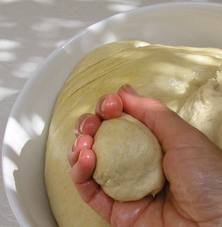When I teach, I have a habit of throwing in a bit of extra information related to the topic, not quite a digression, and definitely tangential. My favorite example is from my Biblical & Classical Literature class at the University of Delaware. When we read Genesis 6, I pause just long enough before jumping into the Noah story to mention that some scholars think the “daughters of men” might have been early homo sapiens who were taken as wives by more Neanderthal-like “children of God,” producing “heroes of old, the men of renown.”  While such a suggestion fits well into Mitch Albom’s newest book, The Time Keeper, it does little to demonstrate the literary aspect of the generational transition from Adam and Eve to Noah. The possibility of pseudo-Darwinian evolution in Genesis 6 is incidental to the introduction of Noah; yet, I find myself compelled to teach it.
While such a suggestion fits well into Mitch Albom’s newest book, The Time Keeper, it does little to demonstrate the literary aspect of the generational transition from Adam and Eve to Noah. The possibility of pseudo-Darwinian evolution in Genesis 6 is incidental to the introduction of Noah; yet, I find myself compelled to teach it.
So why do I do it? In short, I think I toss in extra information as a way of offering a door to students’ further connection with the material. I don’t hold them accountable for the addition; I hold myself accountable for their further education or, at least, engagement with the material.
That being said, I was struck on Sunday by the effect of an incidental teaching in my radio broadcast for WDEL 1150AM‘s “The Rabbi Speaks.” As part of a rotation of area rabbis, I recorded a nine-minute segment to be aired around 8:45am. Later that day, I encountered a parent from my children’s school who, by chance, heard me speaking on the radio around 9:15am. He shared with me that he was particularly struck by . . . an incidental piece of information.
I was speaking about challah, what today is the Jewish ceremonial bread for Shabbat meals. After explaining the origins of the term from the olive size portion of dough given to the priests (or burned for God), I threw in a comment about how these loaves used to be called berches, a few hundred years ago. Berches is reminiscent of the Hebrew word b’rachah, meaning blessing, as in the intentional blessing of bread at a Sabbath meal. It was meant to be an interesting tidbit that I found in an article on www.myjewishlearning.com, nothing more.
There were two things about this encounter that jarred me into thinking more about incidental teaching:
- You never know what is going to stick with people. My larger point was about the variety of types of bread used by Jews throughout the world and throughout history. A braided egg bread is an appropriation from South Germany in the Middle Ages that spread worldwide until today when grocery store bakeries label the loaves as challah, regardless of whether the challah portion was taken from the batch of dough.
- There are nuggets in even our worst teaching. I didn’t think highly of my recording. I felt that I had done better in the past. I remembered as soon as I finished that there were other points I really wanted to make; for example, that today students across the country, and at the University of Delaware Hillel, bake challah to improve the world through the organization Challah for Hunger. Rather than re-record to provide an improved version, I let the original stand. What was good but not great for me turned out to be really meaningful for someone else.
All of which makes me wonder: Maybe the challah portion is symbolically about much more than a portion of dough belonging to God or God’s priests.
Maybe challah is a reminder that the throw-away material is precious. In every batch of teaching material there is one ball that, if tossed gently, will be caught by the learner who needs it most.
What examples from your teaching were the extra portion that stuck?
What does thinking about that extra material as challah portions do for you and/or your teaching?
How can we be intentional with our incidental teaching to better engage our students?
I will be revisiting this idea of incidental teaching when my class starts up in February. Stay tuned for more examples. In the meantime, share your answers to the questions above.


